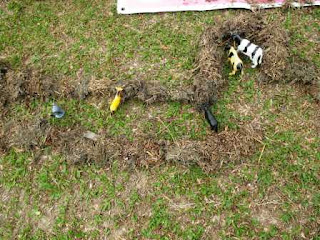Article ini ditulis oleh :
Assist. Prof. Dr. Putri Afzan Maria Zulkifli Deputy Dean, Faculty of Early Childhood Studies, UNITAR http://www.ukm.my/wadahict/kanak-kanak-gajet/

Beberapa tahun dahulu, kita semua mengalami era di mana ‘Bibik menggantikan Ibubapa’ dalam proses pembesaran anak-anak. Kini, fenomenanya agak berbeza sedikit. Fenomena yang menimpa bukan sahaja pada masyarakat di Malaysia, tetapi juga masyarakat di luar negara, di mana ‘Gajet menggantikan Bibik/Ibubapa’.
Ramai yang mengakui, senang jika ada Ipad, sebab ianya memudahkan mereka melakukan kerja rumah, mudah bagi mereka mengawal tingkah laku anak jika berada di rumah kawan sebagai contoh, ataupun di kedai makan. Tetapi, ramai yang tidak sedar, kesan yang boleh memudaratkan anak-anak kecil ini. Adakah anda tahu, bahawa rangsangan yang berlebihan dari penggunaan gajet ini boleh mengecutkan otak anak anda, terutamanya kanak-kanak yang berumur bawah 3 tahun? Gajet yang dimaksudkan ini juga termasuklah penggunaan televisyen, dan apa sahaja yang di tonton dan terhad dalam sebuah kotak.
Kenapa?
Kajian menunjukkan anak-anak di bawah umur 2 tahun yang di biarkan menonton rancangan di TV akan mengalami efek negatif yang lama pada perkembangan bahasa, skil membaca dan ingatan memori jangka pendek. Kesan menonton TV pada 2 tahun pertama juga akan mengganggu tidur dan tumpuan anak-anak apabila mereka meningkat dewasa. Kajian di Malaysia yang ada dilaporkan dalam sebuah mesyuarat ECCE Council baru-baru ini menyatakan bahawa 10 tahun dahulu, kadar masa fokus bagi pelajar di dalam kelas adalah 13 minit. Hari ini, kadar masa fokus telahpun jatuh pada hanya 4 saat. Ramai guru yang mengadu tentang permasalahan mengawal anak murid dalam kelas, dan inilah antara puncanya; terlalu banyak didedahkan dengan pelbagai jenis gajet, tanpa pengawalan yang serius.
Rajah di bawah menunjukkan perbezaan antara otak yang normal dan otak yang mengalami rangsangan gajet yang berlebihan tetapi rangsangan stimulasi sensori yang berkurangan. Buat pengetahuan semua, 3 tahun pertama pertumbuhan otak adalah sangat penting kerana saiz otak adalah dua pertiga saiz otak dewasa. Jika anak-anak mengalami masalah kurangnya stimulasi sensori seperti yang dilihat dalam rajah (ruang-ruang kosong), maka sangatlah rugi besar bila mana sel-sel otak tersebut mati begitu sahaja.
Sebelum anda salah faham, permasalahan ini bukanlah pada apa yang anak-anak lakukan sewaktu menonton televisyen atau sewaktu bermain gajet, tetapi apa yang mereka TIDAK LAKUKAN sewaktu dalam proses tersebut, yang mungkin berjam-jam lamanya (jika tidak dikawal dengan baik). Perkembangan anak-anak adalah berlandaskan pada bagaimana aktifnya mereka berinteraksi dengan ibubapa atau penjaga dan juga sebanyak mana mereka melihat interaksi ini berlaku. Menonton televisyen atau bermain gajet hanya melibatkan efek 2D yang bukan realiti.
Kajian ada melaporkan, kebiasaannya, ibubapa akan bercakap dalam 940 patah perkataan per jam apabila anak-anak ada bersama mereka. Itupun jika ibubapa tersebut prihatin dan rajin bersembang. Apabila TV di pasang, bilangan patah perkataan ini jatuh hingga ke 770 per jam. Semakin kurang perkataan yang di sebut, semakin kuranglah pembelajaran perkataan baru. Semakin kurang jugalah kosakata yang boleh disimpan dalam lexical database otak kita. Antara sebab ramai anak yang lambat bercakap juga adalah di sebabkan oleh kurangnya perbualan antara ibubapa dan anak-anak.
Doktor Christakis yang merupakan Direktor pada Center for Child Health, Behavior & Development in Seattle, juga melaporkan bahawa anak-anak yang di bawah umur 3 tahun akan berkemungkinan besar mengalami masalah fokus di sekolah kelak jika diletakkan di hadapan televisyen berjam-jam lamanya. Malah, dalam kajian beliau mendapati, setiap 1 jam tontonan sehari akan menyebabkan 10% masalah fokus, 2 jam pula akan menyebabkan 20% masalah fokus, jika dibandingkan dengan anak-anak yang tidak didedahkan langsung dengan televisyen. Apa bezanya televisyen dan pendedahan pada gajet yang berjam-jam lamanya dalam satu hari?
Jika betullah kata-kata “you are what you eat” maka, apa yang berlaku adalah “otak anak-anak adalah sebagaimana apa yang dipaparkan pada mereka“. Artikel ini bukanlah bertujuan untuk menyalahkan teknik keibubapaan anda, tetapi untuk kita sama-sama fikirkan cara yang boleh kita perbaiki untuk membantu rangsangan positif pada anak-anak. Bukan tidak boleh menggunakan gajet atau menonton televisyen, tetapi adalah lebih baik jika anda sentiasa bersama anak-anak dan berkomunikasi dengan mereka untuk menstimulasikan otak mereka. Gajet atau televisyen bukanlah babysitter buat anak-anak anda. Adalah tidak adil jika anda menyalahgunakan teknologi dengan cara ini. Rata-rata kajian menyarankan kurang dari 2 jam pendedahan pada gajet atau televisyen setiap hari bagi menyeimbangkan pertumbuhan otak anak-anak anda. Adalah lebih baik jika anak anda yang berumur bawah 2 tahun, langsung tidak didedahkan dengan gajet.










































